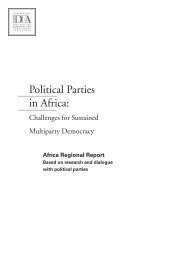Background Document - Danish Institute for Parties and Democracy
Background Document - Danish Institute for Parties and Democracy
Background Document - Danish Institute for Parties and Democracy
Create successful ePaper yourself
Turn your PDF publications into a flip-book with our unique Google optimized e-Paper software.
dialogue across party lines. It also brings together nineteen political youth <strong>and</strong> student<br />
organisations from different backgrounds. It aims, among other things, to enable<br />
capacity building of the youth <strong>and</strong> student wings of political parties.<br />
The small-scale study on women’s role in Nepalese youth politics <strong>and</strong> in the work<br />
of the plat<strong>for</strong>m clearly showed that Nepalese society still relies strongly on patriarchal<br />
values <strong>and</strong> these were reflected in the political parties overall <strong>and</strong> in the scheduling of<br />
youth activities particularly. Political parties were dominated by a male political culture<br />
<strong>and</strong> it created barriers to women’s advancement towards high positions.<br />
In the interviews, young females felt that gender quotas had substantially improved<br />
their political participation even in the Joint Youth <strong>and</strong> Students’ Plat<strong>for</strong>m. A<br />
common wish was that the quotas would be extended to the decision-making level so<br />
that women could be involved on the top level. DemoFinl<strong>and</strong> has also organised a successful<br />
exchange about experiences between women’s units in Ghana <strong>and</strong> Tanzania.<br />
Similarly, NIMD has organised discussions between youth units of different countries,<br />
regions <strong>and</strong> political parties in order to share knowledge about difficulties <strong>for</strong><br />
young people in being meaningfully included in political parties. Initiatives such as<br />
Suriname <strong>and</strong> The Netherl<strong>and</strong>s youth wing, the Bolivian partner program (FBDN), The<br />
Youth Commission of the Permanent Forum of Political <strong>Parties</strong> in Guatemala, were<br />
implemented to increase knowledge among young people.<br />
THE AUSTRALIAN ‘NEXT GENERATION’ INITIATIVE 14<br />
Following a call from its members to increase young women’s political en-gagement<br />
in decision-making positions, the Labor Party in Australia has put in place the ‘Next<br />
Generation’ initiative. This initiative aims at giving real-life experiences of political<br />
action to young women. The program consists of two streams: a residential program<br />
<strong>and</strong> placement in a campaign.<br />
The residential program aims at placing young women with women who hold a<br />
decision-making position, such as a high position in a political office, a union or a nongovernment<br />
organisation. The second part of the program is to place young women in<br />
a political campaign. As such, young women will follow a c<strong>and</strong>idate that is running <strong>for</strong><br />
election <strong>and</strong> learn first h<strong>and</strong> the ‘unwritten rules’ of a political campaign.<br />
These two programs are associated with workshops: one is called ‘Empowering<br />
Women’s Professional Development Program’ <strong>and</strong> the other is speed date mentoring.<br />
The first workshop aims at ‘providing political skills training, including campaign<br />
planning, government lobbying, affirmative action strategies <strong>and</strong> social change advocacy’.<br />
Speed date mentoring is aimed at providing a plat<strong>for</strong>m <strong>for</strong> women to support<br />
women, such as Networking Events. These events are tailored <strong>for</strong> young women. The<br />
women’s wing of the Labor Party is using a wide range of mediums that include Facebook,<br />
Twitter, the political party base <strong>and</strong> university political groups to reach out to<br />
young women via this program.<br />
After running it <strong>for</strong> two years, an evaluation of the ‘Next Generation’ initiative has<br />
shown real enthusiasm as members asked to retain it.<br />
THE COMMITTEE TO PROMOTE WOMEN IN POLITICS IN CAMBODIA<br />
A grant was made by the UNIFEM/UNDEF program to promote women in politics in<br />
Cambodia. This was used to improve public support <strong>for</strong> women politicians. It included<br />
strategies to achieve objectives such as training, advocacy, dialogue, civic education<br />
<strong>and</strong> the development of a peer support network. This project was put into place in 12<br />
of the 24 provinces of Cambodia.<br />
14 A special thanks to Hutch Hussein, EMILY’s List Australia National Co-Convenor who was interviewed<br />
to share in<strong>for</strong>mation about this initiative.<br />
WOMEN IN POLITICS DANISH INSTITUTE FOR PARTIES AND DEMOCRACY PAGE 17
















